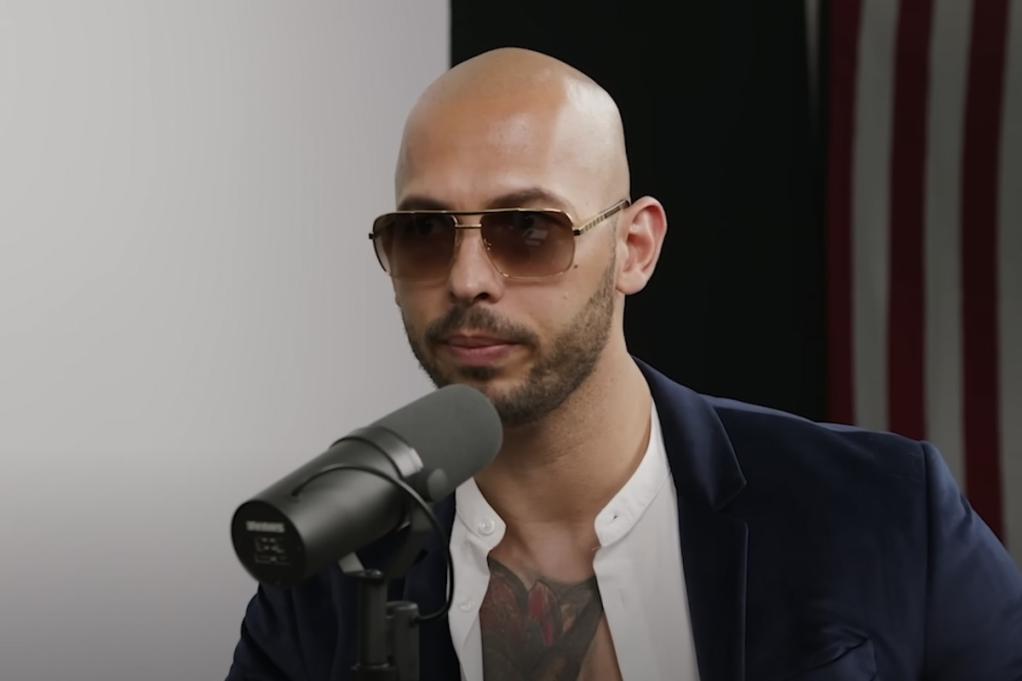
Please note: this article includes sensitive topics that some people might find difficult. Please visit our Resources Page for help.
“It’s bang out the machete, boom in her face and grip her by the neck. Shut up bh,”
These are the frightful words of Andrew Tate, ex kick-boxer turned ‘self-help’ guru, who has recently risen from a dim corner of the internet to mainstream media. Tate made his fortune as a pimp for online cam-girls and a provocateur par excellence. He is best known for his views on women which appear almost like a parody of misogyny.
Tate believes women belong in the home, can’t drive, and are a man’s property. He also says that rape victims must “bear responsibility” for their attacks, and that he dates younger women so he can “imprint” on them. Tate thinks a good wife should allow and their husband to cheat, after all, that’s “not love, it’s exercise”. He also has a deep mistrust of female pilots who, in his view, just won’t deal with an emergency as well as a man. You may not be surprised to hear that this same “beacon of feminism” has had run-ins with the police over alleged abuse of women on several occasions.
“I go out and [sleep with] her and I come back to her and I don’t care about her and I only love my girl. That’s not cheating, that’s exercise.”
“They’re like, ‘you’re under arrest for a suspicion of assault of this dumb h-e"
Tate has truly elevated the online “women/men are trash” trope to an art form, and has painted the internet with his particular brand. Videos of Tate’s misogynistic views have viralled the internet over the last few weeks, with the Luton-born 35-year-old reportedly getting more Google searches for his name than Donald Trump or Kim Kardashian. “I thought it was satire at first and didn’t take it seriously,” said one young man we spoke to. “Then I kept seeing more and more media outlets giving him a platform – it seemed obvious that they were doing it for clicks and views.”
Finally, after weeks of widespread misogenistic views Meta, TikTok and YouTube banned Tate’s social media accounts. Although VoiceBox welcomes this decision as a step in the right direction to purge our digital spaces from dark-age misogyny, the removal of him from their platforms is not likely to have the snowball effect that tech giants were hoping for.
Research shows followers of Tate are still ramifying social media with his most controversial clips – which many have described as a glaring strategy to artificially boost his content. Tate has since amassed a huge following online, potentially earning millions of pounds, and godfathering 127,000 members of Hustler’s University community, described as a private online academy in which you must pay £39 a month for the pleasure of joining.
A young man we spoke to said, “Boys and young men are getting sucked in by him. It’s hugely worrying that it’s happening to both groups considering how big a part they will be playing in the future of society.” Tate often frames his behaviour from a place of protection, the old-fashioned gender stereotype that women are weak creatures of beauty who need saving by a ‘powerful’ man.
“Any woman who is going to sit there and think it’s more important to argue with me about she [how] is as capable as a man at everything, [...] as opposed to just letting me pay the bill and be pleasant, is not the kind of woman I want to talk to.”
But the persistent exposure that Tate is enjoying isn’t just coming from his fans. Despite millions of young people openly condemning him online, it is that very attention that continues to propel him into the spotlight. There is an old-fashioned idea that people will be drawn towards other people and activities that bring them joy. One could be tricked into thinking that, in a sane world, we would listen to those whose words “sparked joy” or consume content that helped us smile and relax after a long day. However, the world of the internet seems to be inverted, with content that receives overwhelming backlash and negative feedback receiving just as much if not more attention than positively received content.
The fact is that in our current media landscape, dislikes, downvotes and hatred are an energy that can propel people to fame more effectively than anything else. You want to create an ad campaign that will make more people aware of a product or service? Take the time to alienate a group of people who will then click on your ad just to dislike it, thereby promoting it in the web of algorithms we are all caught in. Want to become a successful artist? Write a song about how people who love music are idiots and watch as your listeners spike with people who want to hear your idiotic views just so they can leave a bad comment then, just as the dust settles, convert your internet notoriety into a confused but large audience.
Famous YouTuber PewDiePie demonstrated this exact concept with his “Can this video get 1 million dislikes” video in which he requested that all his followers dislike the video instead of liking it. The video garnered over 5.5 million dislikes, making it one of the most disliked videos on the platform of all time. Despite the video receiving so many dislikes, it also gained over 25 million views.
Despite the recent bans on Tate, it seems that the major social media companies have been slow off the mark to identify and remove videos of Tate from copycat accounts. Some are also raising the question of why it took so long for Tate himself to be removed from the platforms when he was clearly violating many of their policies. All which begs the question as to whether the task was simply too daunting, or whether the tech firms were enjoying the traction on their platforms a little too much. TikTok has since launched an investigation into misogynist content, and we hope to see an enhancement in its detection policies and systems.
Whether Tate is banned from social media or not, the epidemic of dangerous misogyny has already begun, with women expressing distress at the change of mindset that some of their male friends and partners are displaying towards them. And even in the extremely unlikely event that Tate gets completely wiped from the internet, it seems like there will always be another infamous and problematic internet character to take his place, because unfortunately, there seems to be another overwhelming issue at hand. It seems unlikely that our online world will suddenly shift to promote joy and well-being over hate. If it isn’t broken, don’t fix it, and as long as the clicks and the cash are coming in, it isn’t broken. But without a change in the online culture, we will continue to see the worst people promoted into the ranks of internet stardom, leading internet users worshipping an upside-down pantheon of internet gods who will drive people towards values that have been shown again and again to lead to violence and harm.
To keep up to date with what is happening at VoiceBox, make sure to sign-up to our newsletters.





